Best of Five MCQs for the Rheumatology SCE is a revision guide designed specifically for this high-stakes exam. It contains 300 Best of Five Questions with explanatory answers, each accurately reflecting the layout of questions in the exam. The book is divided into three exam papers for trainees to test themselves, providing a through assessment of the candidate’s rheumatology knowledge. The book covers all the main themes of the exam. Topics include: inflammatory arthritis, connective tissue disorders, metabolic and bone disease, osteoarthritis, and paediatric and adolescent rheumatology. The explanatory answers include references to guidelines and other sources to enable candidates’ further reading and study. Providing high-quality questions and expert guidance, this resource is a comprehensive revision tool for senior rheumatology trainees preparing for postgraduate exams.
| Categories: | All, distributed, Orthopedic |
|---|
| Weight | 600 kg |
|---|
Related products
-
Clinical Pediatric Dermatology
₹1,350.00This book aims at bridging that gap and putting the basic concepts of pediatric dermatology together which help the dermatologists,post graduates and pediatricians understand and manage the pediatric dermatoses in India. With primary focus on beginners in pediatric dermatology and pediatricians,the conciseness and brevity of clinical notes has not been compromised. This book has been written keeping in view the interests of both pediatric dermatologists and pediatricians. In this era of sub-specialization, general pediatricians who offer primary care to children must be knowledgeable in pediatric dermatological problems.
-
Puzzling Cases in Stroke Vol. 2
₹1,695.00Stroke is a treatable medical emergency affecting about 15 million people every year worldwide. It is the most common cause of common cause of disability globally and is the third most common cause of death. In the present times, there are effective treatment options which if given timely will benefit the patients of stroke remarkably. Therefore, correct diagnosis of acute stroke is extremely important for the clinicians to provide appropriate treatments and to ensure prevention of acute complications, including recurrent strokes. But sometimes a typical or uncommon presentation of stroke or “stroke chameleons”can lead to diagnostic dilemma. Therefore, timely diagnosis and management may be delayed. There are time – tested strategies which when strictly followed by the Neurphysician can reduce the chances of missing the correct diagnosis. Firstly, “Listen very carefully to the patient. He is telling you the diagnosis.” Clinicians should suspect stroke when the history suggests abrupt onset of neurological symptoms. Remember, Stroke is a clinical diagnosis and imaging is providing the corroboratory evidence. Secondly, a complete and systematic neurological examination should be routinely done in patients presenting with acute neurological symptoms because this might shed light on the true nature of the problem. Finally, even the most sophisticated neuroimaging tests might miss the stroke in the early hours after the event.
-
Current Progress in Nephrology Volume 2
₹1,500.00The aim of the 2nd volume of this book is to address the basic concepts and newer developments in selected areas of clinical nephrology, dialysis and renal transplantation. Selected topics on interest with reference to recent developments, updated classifications or advances in pathogenesis and treatment. Nephrologists from around the world have contributed to this one of its kind book.
-
Grand Rounds in Nephrology
₹2,295.00Thirty-six different case scenarios including clinical nephrology, dialysis and kidney transplantation have been discussed in this volume. Each case scenario is followed by a focussed discussion on a selected aspect in a question answer format. For this issue, eminent nephrologists from all over India have contributed and shared their vast knowledge and experience. This book will be useful to the residents in Nephrology who are preparing to take the examination as well as clinical nephrologists to revise and update their knowledge and skills. Training and ability to present the available data clearly and answering questions with reasonable self-assurance is important when taking a clinical examination or viva-voce. The cases selected are broad based, covering kidney diseases in children, glomerular diseases, non-glomerular kidney diseases, genetic disorders, acute kidney injury, chronic kidney disease, electrolyte abnormalities, dialysis and transplant related clinical scenarios.
-
Current Progress In Nephrology Volume 1
₹1,500.00The aim of the book is to address the basic concepts and newer developments in selected areas of clinical nephrology, dialysis and renal transplantation. Selected topics on interest with reference to recent developments, updated classifications or advances in pathogenesis and treatment. Nephrologists from around the world have contributed to this one of its kind book.
-
Current Progress in Orthopedics Vol . 3
₹1,500.00Not unexpectedly, since Andry coined the term Orthopedics, the world has undergone a drastic change! New knowledge, new techniques, new technology! The fundamental principles however do not change and that is why they remain fundamental! Andry emphasized the prevention of deformities and we understand this better. Yet our preventive efforts are second to our therapeutic ones! A radical change in our mind set is imperative! We need to have surveillance for preventable problems. Early detection equates to simpler and better management! Things need to change for the better. Orthopedic surgeons need to become social scientists and harbingers of change! This, the 3rd volume of Current Progress in Orthopedics brings together many world leaders in Orthopedics for you. Each one opens a facet of culled knowledge and wisdom gained from the experience of a life time dealing with different problems in Orthopedics. We hope you will be thrilled to read their offerings which should give you a comprehensive background of the subject and the current philosophy of management.
-
Dermatological Diseases A Practical Approach 3/Ed. – Revised & Updated
₹1,595.00Dermatology has grown much since the release of the second edition, with several advances in different fields suchh as lasers, biologics, drug therapy, dermoscopy. But the most notable change has been the change in profile, with emphasis on procedural dermatology and visibility on social media. The new 3 rd Edition reflects these changes and is therefore a thoroughly revised edition. Several new images have been added to make it more illustrative. However, the emphasis on clarity in a reader- friendly manner. Therefore the emphasis on text boxes, schematic diagrams, and flow charts continues. A new addition is the list of suggested reading, MCQs and case reports for each chapter. The Following quote form previous edition is still relevant: Writing of a book is like sawing a saw- it sharpens the mind and freshens the knowledge and is thus a process that gives immense satisfaction and joy. This satisfaction and joy will be greater if the readers too find it a valuable tool to enhance their knowledge.

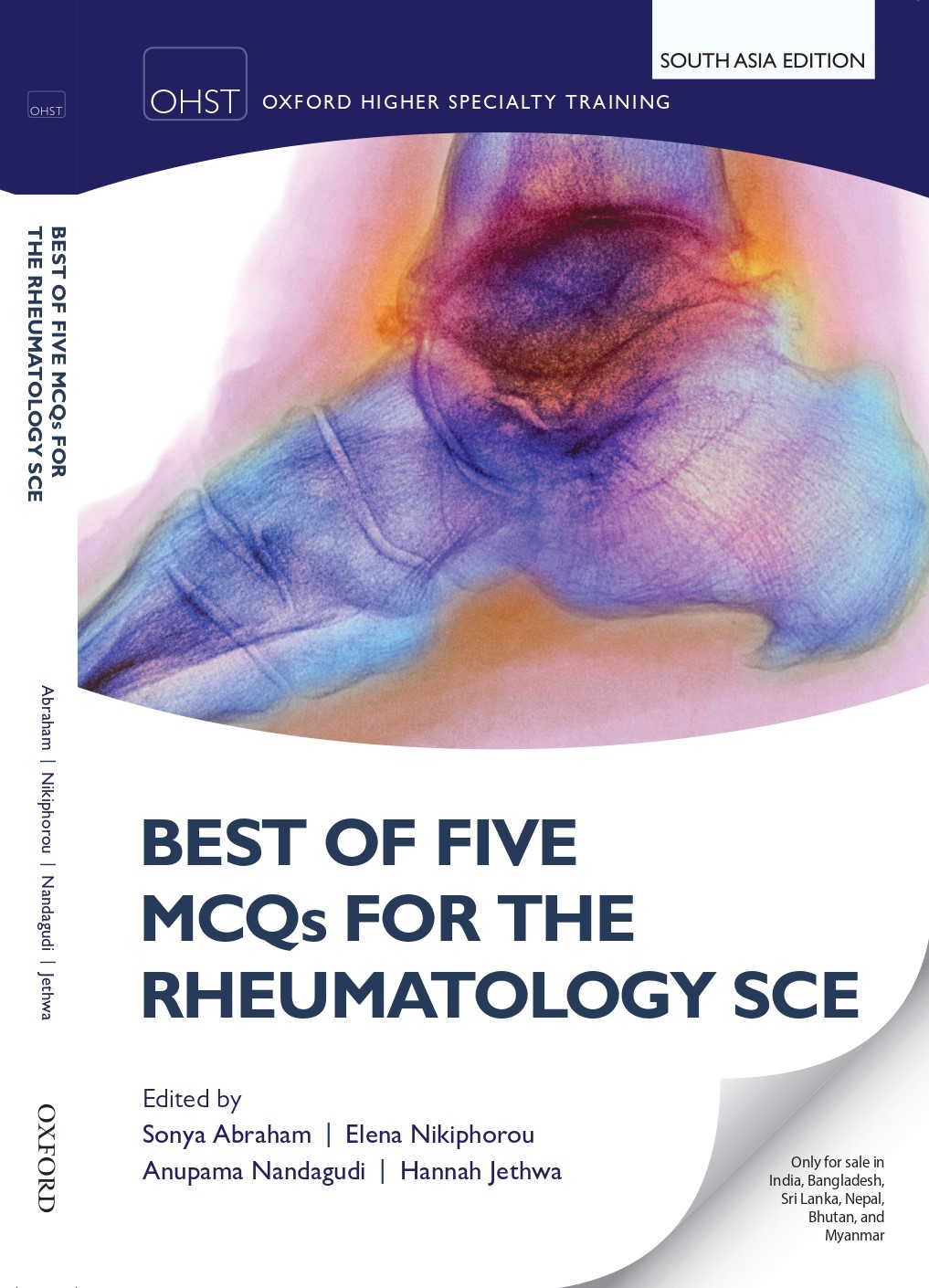
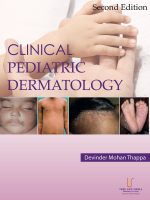
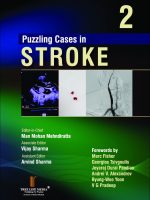
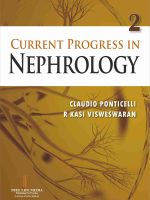
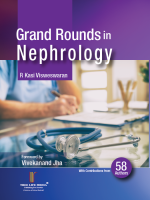
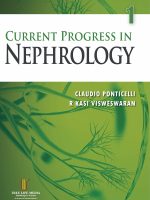
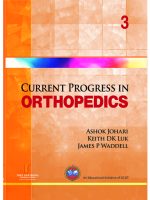
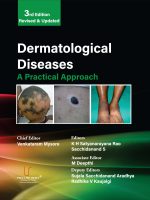

Be the first to review “BEST OF FIVE MCQs FOR THE RHEUMATOLOGY SCE”